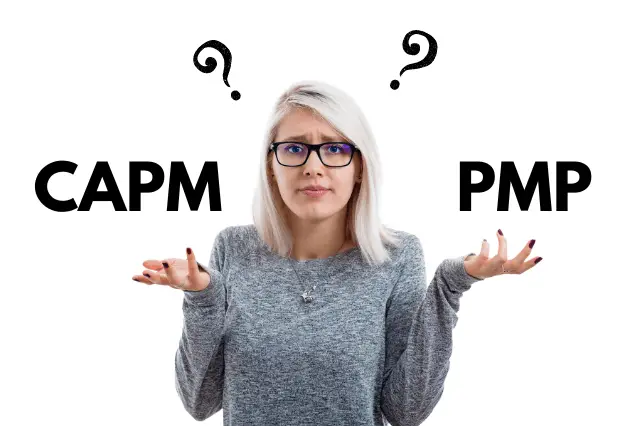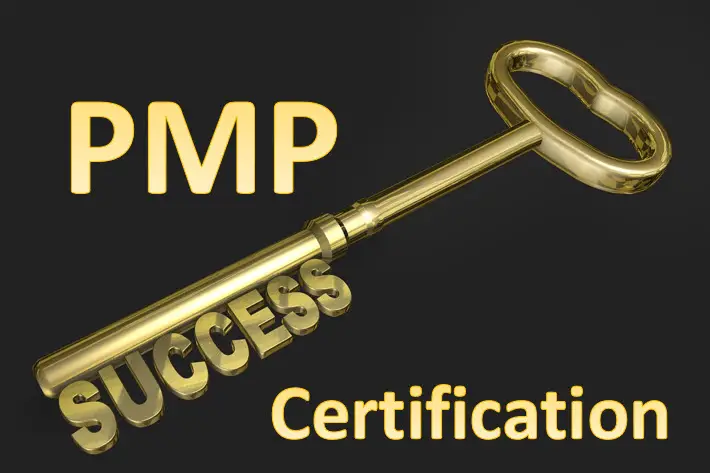Last Updated on September 16, 2025 by andrewshih
Are you exploring both PMP vs PRINCE2 certification, but you are not sure which one is right for you?
When it comes to boosting your career as a Project Manager, getting certified is a smart move. Both PMP and PRINCE2 are premier certifications in the project management industry worldwide.
Project Management Institute (PMI) research indicates a big demand for project managers, with 2.3 million jobs annually until 2030. It is clear that holding a project management certification offers an advantage.
In this article, we’re breaking down PMP and PRINCE2, giving you a side-by-side look at what they offer. We want to help you decide and pursue the project management certification that best fits your needs.
Disclaimer: Some of the links below are affiliate links, which means that if you choose to make a purchase, I will earn a commission. This commission comes at no additional cost to you. Please review the full affiliate disclaimer.
PMP VS PRINCE2 CERTIFICATION
What is the PMP certification?
The Project Management Professional (PMP)® certification is a professional designation managed by the Project Management Institute (PMI).
The first PMP certifications were issued in October 1984. According to PMI, there are now over 1,200,000 certification holders around the world. For many US-based project management jobs, PMP certification is the preferred certification.
PMP emphasizes a flexible approach applicable to diverse industries and methodologies, covering various approaches such as waterfall, agile, and hybrid, and key skills such as people, process, and business environment, and key knowledge areas such as project initiation, planning, execution, monitoring, controlling, and closing.
PMP certification is recognized internationally and signifies a commitment to best practices in project management. This certification is sought after by professionals aiming to demonstrate their expertise in leading and directing projects.
What is PRINCE2 certification?
PRINCE2 (Projects IN Controlled Environments) certification is a structured project management framework originating from the UK government in 1989.
PRINCE2 provides a detailed, process-driven methodology for project success that emphasizes on the “what,” “how,” “who,” and “when” of project management,
The certification, awarded through Axelos-accredited training organizations, is widely adopted in the UK, Europe, and beyond. PRINCE2 divides projects into manageable stages, each with defined roles and responsibilities.
It is particularly suitable for those who prefer a prescriptive and systematic approach to project management. PRINCE2 certification is often chosen by professionals working in environments that prioritize a methodical and controlled project management approach.
PMP certification vs PRINCE2 certification Comparison
PMP and PRINCE2 are two different project management certifications, each with its own approach and focus.
The comparison table below highlights the differences between the two certifications.
| PMP | PRINCE2 | |
|---|---|---|
| Provider | The Project Management Institute (PMI) administers PMP. | Axelos |
| Origin | The United States of America | United Kingdom (UK) |
| Year started | 1969 | 2014 |
| Approach | Applied knowledge for managing people, processes, and the business environment. | Process-based on principles and best practices. |
| Geographic Demand | USA, Canada, Australia, Switzerland, India, China, and other Asia countries. | UK, Australia, and European countries. |
| Members | Over 3 million members with over 1 million active certification holders | Over 1 million |
PMP certification is more well-established and has more members around the world.
Depending on your geographic location, you may find more job opportunities for one certification than the other. However, you may also likely find that both certifications are acceptable for the job opportunity that you are seeking.
The best approach is likely to utilize the search on several job search sites and find out which certification is more appealing to employers based on where you want to work.
PMP vs PRINCE2 Requirements
PMP certification requirements
PMP certification requires minimum education and project management experience. You must complete these requirements before considering PMP certification. If you do not meet these requirements, you may want to consider CAPM certification.
Depending on your educational background, there are several paths to meeting the minimum requirements.
Educational Background | Project Management Experience | Project Management |
Secondary degree (high school diploma, associate’s degree or global equivalent) | Minimum five years/60 months of unique non-overlapping professional project management experience* | 35 contact hours of |
OR | ||
Four-year degree (bachelor’s degree or global equivalent) | Minimum three years/36 months of unique non-overlapping professional project management experience* | 35 contact hours of |
OR | ||
Bachelor's or post-graduate | Minimum two years/24 months of unique non-overlapping professional project management experience* | 35 contact hours of formal education unless you are an active CAPM holder |
PMI removed the 4500 (for college candidates) and 7500 (for high school candidates) hours of work experience requirement since 2021. Many other blogs still mention this requirement, but it is outdated information.
PRINCE2 Certification Requirements
The requirements for taking the PRINCE2 exam and obtaining certification may vary depending on the certification level (Foundation or Practitioner). However, here are general guidelines:
PRINCE2 Foundation requirements
There are no formal prerequisites for the PRINCE2 Foundation exam. It is designed to assess a candidate’s understanding of the PRINCE2 principles, processes, and themes.
PRINCE2 Practitioner requirements
Prerequisites: To take the PRINCE2 Practitioner exam, you must have passed the PRINCE2 Foundation exam or hold one of the recognized certifications listed as an alternative. If you hold any of the following certifications, you can take the PRINCE2 Practitioner exam without taking the Foundation exam:
- Project Management Professional (PMP)
- Certified Associate in Project Management (CAPM)
- Project Management Qualification (PMQ)
- Project Professional Qualification (PPQ)
- IPMA Level A, B, C, or D
CAPM and PMP are governed by Project Management Institute, Inc.
PMQ and PPQ are governed by the Association for Project Management
IPMA Level A/B/C/D’ are governed by the International Project Management Association.
PMP vs PRINCE2 requirement comparison
In a nutshell, here is a quick side-by-side comparison of the requirements.
| PMP | PRINCE2 Foundation | PRINCE2 Practitioner | |
|---|---|---|---|
| Project Management Experience | 3 or 5 years, depending on the education. | Not required | Not required |
| Education | College or high school | Not required | Not required |
| Training or Prerequisite | 35 contact hours or CAPM certified. | Not required | Foundation, CAPM, PMP, PMQ, PPQ, or IPMA |
PMP certification has education and project management work experience requirements not required by PRINCE2 certification. You can start with CAMP certification if you prefer to follow the PMP career track but haven’t met the work experience requirement.
PMP vs PRINCE2 Certification Process
PMP Certification Process
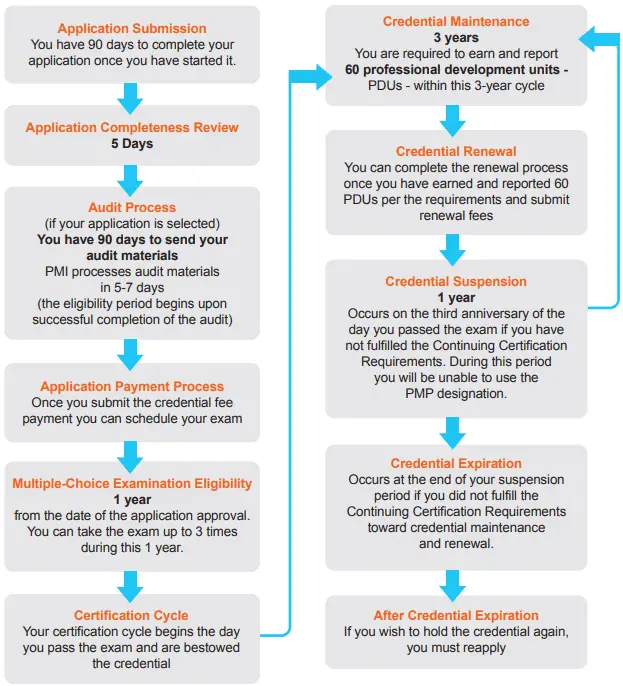
The diagram from PMI illustrates the PMP certification process. The candidate must submit the application, demonstrating the candidate meets all the requirements, and write a project description for each project listed in the application.
The application is randomly audited. Once the application is approved, the candidate can take the PMP exam within one year of the application approval.
Once the candidate passes the PMP exam, the candidate will earn the PMP certification and will need to earn 60 PDUs every three years to renew the certification.
PRINCE2 Certification Process
The PRINCE2 certification process is much simpler.
- Choose the Certification Level: Decide whether to start with the PRNCE2 Foundation or PRINCE2 Practitioner exam based on your experience.
- Training: Enroll in a PRINCE2 training course from an accredited training organization. Training is available in various formats, including classroom-based, virtual, or self-paced online courses. Ensure that the training provider is officially accredited by AXELOS.
- Study and Preparation: Devote time to self-study and preparation for the certification exam. The Foundation level typically assesses understanding of PRINCE2 principles and terminology, while the Practitioner level focuses on the application of these concepts in real-world scenarios.
- Take the PRINCE2 Exam: After completing the training, you’ll need to pass the PRINCE2 certification exam.
- Maintaining Certification: There are several ways to maintain the PRINCE2 certification, which we will discuss later.
PMP vs PRINCE2 Certification Process Comparison
The table below highlights the key differences between PMP and PRINCE2 certification process.
| PMP | PRINCE2 | |
| Application Process | YES | N/A |
| Application Audit | YES, Random. | N/A |
| Exam fail attempts | 3 attempts in 1 year. | No limit |
One key difference between the PMP and PRINCE2 certification process is that PMP candidates must go through a rigorous application process to verify the candidate satisfies all the education, training, and work experience requirements prior to taking the PMP Exam.
The candidate has 30 days to finish the application process once it’s started. Otherwise, the candidate will need to start the application again.
To uphold the brand of PMP certification, the PMP applications are randomly selected for audit. The percentage of students that get audited is not disclosed by PMI. In contrast, PRINCE2 does not require a cumbersome application and a dreaded audit process by the candidates.
Another difference is that PMP only allows 3 exam attempts within one year. If the candidate is unfortunate enough to fail all 3 exams in a year, the candidate will need to start the PMP process all over again. PRINCE2 has no limit on how many times the candidate can take the exam.
The PRINCE2 certification process is simpler.
PMP vs PRINCE2 Exam Cost
PMP Exam Cost
Once your PMP application has been approved, you can go to the PMI website to register and pay for the exam. You can select the date, time, and exam center as per your convenience.
While it is not required to become a PMI member, however, PMI offers incentives to become a member, including a discount for the exam fee:
- $405 for PMI members
- $555 for non-PMI members
Learn more about all the PMP certification costs.
PRINCE2 Exam Cost
PRINCE2 exam cost varies depending on the Axelos accredited training providers. Axelos works closely with PeopleCert and other training partners for the PRINCE2 exam. However, Axelos does not dictate the price of the exam.
Generally, the training provider will include the training and the exam in the total cost. You can find a training provider from the Axelos training provider search engine.
For the PRINCE2 training and exam with PeopleCert, here are the costs:
- PRINCE2 Foundation: $680
- PRINCE2 Practitioner: $755
As an alternative, it is possible to self-study with an affordable Udemy PRINCE2 course.
The PRINCE2 Foundation & Practitioner Certification Masterclass has received many good reviews. Once you complete the course, then sign up for the PRINCE2 exam with a training provider such as KnowledgeTrain that offers the exam-only option. The overall cost will likely be cheaper than attending the live training class with the exam.
PMP vs PRINCE2 Exam Cost Comparison
While PMP exam cost alone may seem cheaper, most candidates will prepare for the exam using an on-demand or boot-camp training provider and practice using an exam simulator. There are cheap ways to study for the PMP exam, but the overall cost of getting the PMP certification will be more expensive.
PMP vs PRINCE2 Exam Format
PMP Exam Format
PMP exam consists of 180 questions that must be completed in 230 minutes. (The old exam has 200 questions in 4 hours.)
Five pre-test questions are not graded and embedded within 180 questions. Those five questions are used to ensure quality and prepare for future exams. There are two 10-minute breaks at 60th and 120th question mark.
The majority of the exam questions will be quite lengthy and based on project management scenarios. The exam tests the candidate’s ability to apply project management knowledge.
The candidate can take the exam remotely (e.g., at home) or in person at a Pearson Vue center.
PMI does not disclose the passing score, but it’s generally estimated at 61%. The candidate can take the exam up to 3 times within a year. If the candidate fails all three attempts, the candidate will need to start the PMP certification process again.
PMP Exam Content Outline
According to PMI, here is the exam content outline for the PMP Exam.
| People | 42% |
| Process | 50% |
| Business Environment | 8% |
PMP Exam Questions
Many of the questions on the PMP exam will be given a project management scenario, and you must choose the best answer. Finding more than one acceptable answer is not unusual, but you must pick the best one.
In addition to standard multiple-choice questions, the exam also consists of multiple responses, matching, hotspot, and limited fill-in-the-blank style questions. PMI provided a few prototype questions to help candidates become familiar with those new question formats.
PMI does not publish realistic exam questions. However, several training providers offer free exam simulators, and you can find the collection near the bottom of this resource page.
PRINCE2 Exam Format
PRINCE2 Foundation Exam Format
PRINCE2 Foundation exam consists of 60 multiple-choice questions for 60 minutes. All the multiple-choice questions have four choices with one correct answer. Most of the questions are not lengthy and test the knowledge of PRINCE2 knowledge and practices.
PRINCE2 Foundation Exam Content Outline
According to Axelos, this is the PRINCE2 7 Foundation Exam Content Outline:
| Key concepts relating to projects and PRINCE2 | 3% |
| How the PRINCE2 principles underpin the PRINCE2 method | 8% |
| Importance of people in successful projects | 14% |
| PRINCE2 practices and how they are applied throughout the project | 60% |
| PRINCE2 processes and how they are carried out throughout the project | 15% |
PRINCE2 Foundation Exam Questions
Here are different styles (standard, list, missing word, and negative) of multiple-choice questions that you can expect on the PRINCE2 Foundation exam. All of the questions have four choices with one correct answer.
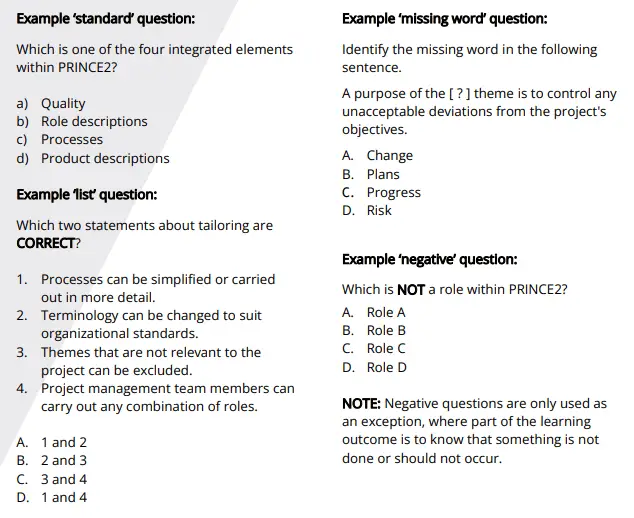
Here is a sample PRINCE2 Foundation exam question from PeopleCert:

PRINCE2 Practitioner Exam Format
As expected, the PRINCE2 Practitioner exam is more challenging than the foundation exam. The exam consists of 70 multiple-choice questions. The exam question is more wordy and tests the candidate’s ability to apply PRINCE2 in various project management scenarios.
PRINCE2 Practitioner is an open-book exam, and you can use PRINCE2 7 Managing Successful Projects Official Book during the exam.
PRINCE2 Practitioner Exam Content Outline
According to Axelos, this is the PRINCE2 7 Practitioner Exam Content Outline:
| How to apply the PRINCE2 principles in context | 10% |
| How to apply effective people management in successful projects | 9% |
| How to apply and tailor relevant aspects of PRINCE2 practices in context | 51% |
| How to apply (and tailor) relevant aspects of PRINCE2 processes in context | 30% |
PRINCE2 Practitioner Exam Questions
PRINCE2 Practitioners have standard and matching multiple-choice questions. You should expect the actual exam questions to be more wordy than the examples provided.
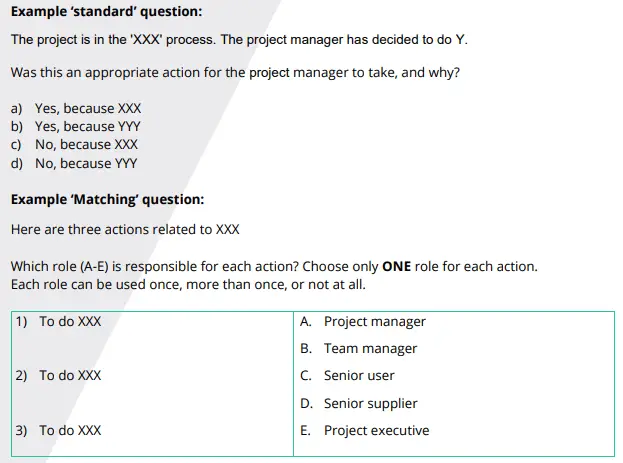
Here is a sample PRINCE2 Practitioner exam question from PeopleCert:
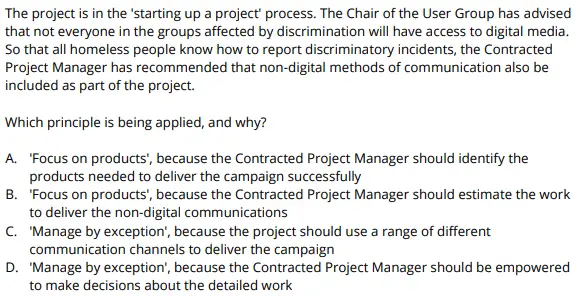
PMP vs PRINCE2 Exam Format Comparison
Here is a side-by-side comparison of the PMP and PRINCE2 exams.
| PMP | PRINCE2 Foundation | PRINCE2 Practitioner | |
| No. Of Questions | 180 questions (includes 5 pre-test questions not scored)* | 60 questions | 70 questions |
| Total Time for exam | 230 mins | 60 mins | 150 mins |
| Exam Breaks | Two 10-min breaks at 60th & 120th questions. | N/A | N/A |
| Exam Pattern | Mostly Scenario Questions. Multiple Choice, Multiple responses, hotspots, few filled-in the blanks | Multiple choice questions with 4 choices. | Objective testing. Standard and matching multiple choice. |
| Minimum Passing Score | Not Disclosed. (61% expected) | 60% (36/60 questions) | 60% (42/70 questions) |
| Close/Open Book | Close | Close | Open (PRINCE2 manual only)** |
| Exam Center | Pearson VUE | PeopleCert | PeopleCert |
| Online Exam Option | YES | YES | YES |
| Take Exam from Training Provider | NO | YES | YES |
*Please note that many outdated blogs may still mention the PMP exam with 200 questions and 4 hours of exam time.
**For PRINCE2 Practitioner exam, open book means the candidates are permitted to use the official printed copy of the PRINCE2® 7 Managing Successful Projects. The official manual can have annodation, but no sticky notes and loose paper with additional notes allowed.
PMP vs PRINCE2 Exam Preparation
PMP Exam Preparation
On average, PMP candidates devote about 8 to 12 weeks to studying for the PMP exam.
While there are plenty of free resources to supplement PM exam preparation, most candidates use on-demand or boot camp training to prepare for the PMP exam and satisfy the 35 contact-hour training requirement. Most of the candidates will practice using a premium exam simulator with realistic exam questions.
For more tips on PMP exam preparation, refer to this article.
PMP Books and Study Guides
I provided a list of books provided by PMI as well as the most popular study guides in this article.
Three most important official reference guides are:
Please note that the PMP exam is based on the Exam Content Outline and is not strictly tied to those three official guides. PMI included 8 additional books on the list as top references for crafting the PMP exam.
In reality, it is unrealistic to prepare for the PMP exam by cramming nearly a dozen textbooks. A candidate may purchase the hard copy of the official guides (or download the digital version for free if you are a PMI member) and use them as a reference. Most candidates utilize a training provider to prepare for the PMP exam.
PRINCE2 Exam Preparation
On average, a candidate will dedicate 1 to 3 weeks to prepare for either the PRINCE2 Fundamental or the Practitioner exam.
As mentioned, a candidate can self-study or use an accredited training provider that provides both the training and the PRINCE2 exam.
PMP Books and Study Guides
PMP vs PRINCE2 Exam Preparation Comparison
| PMP | PRINCE2 | |
| Training Options | on-demand (self-paced), Live boot camp (typically 4 days) | on-demand (self-paced), Live boot camp (typically 3 days) |
| Exam Prep Time | Typically 8~ 12 weeks | Typically 1~3 weeks |
Most candidates will likely need more time to prepare for the PMP exam than the PRINCE2 exam.
Both PMP and PRINCE exams offer self-paced and boot camp training. The boot camp training can both be virtual or in person. Typically, the PMP boot camp training requires four days, whereas PRINCE boot camp training takes three days.
PMP vs PRINCE2 Certification Renewal
PMP Certification Renewal
Maintaining your PMP requires you to complete 60 professional development units (PDU) every three years and pay a renewal fee of $60 if you are a PMI member or $150 for a non-member. Each PDU is equivalent to one hour of performed activity.
There are many ways to earn PDU which can be divided into two categories – education and giving back to the profession.
Education:
- Formal instructor-led training and course
- Global live, virtual, or on-demand events, available on PMI event calendar
- Local PMI chapter meetings with keynote speakers about the profession.
- Self-paced learning and webinars, including ProjectManagement.com and on-demand courses.
- Reading PMI books
- Informal Learning, including structured professional discussions, mentoring, and “lunch and learn”
Give back to the profession:
- Work as practitioner
- Create content for ProjectManagement.com
- Give a presentation at PMI chapter event or your organization.
- Share knowledge such as mentoring or teaching.
- Volunteer for PMI or local PMI chapter
PRINCE2 Certification renewal
PRINCE2 certification will need to be renewed every 3 years.
According to PeopleCert, there are three ways to renew your PRINCE2 Foundation and Practitioner certifications.
- Retake the same test: Renew your certification by retaking the original test before it expires.
- Take more classes and tests: Renew your certification by joining another class and completing a test in the same category before the expiration date.
- Renewal Axelos membership and earn Continuing Professional Development (CPD) points: Renew your certification by gathering and recording CPD points. Each year, you should submit 20 CPDs. You must earn 60 CPDs in the third year for renewal.
The easiest and most economical way to renew your PRINCE2 certification is via Axelos membership. Once you pass the PRINCE2 certification, you will maintain the Axelos membership and earn 20 CPDs each year, for a total of 60 CPDs in 3 years.
Here are how you can earn qualified CPDs:
- Professional Experience: (5 CPDs required from this category). The activities must be related to project management, such as applying best practices, coaching, managing, shadowing or monitoring individuals, or utilizing templates from PRINCE2 portal.
- Training: (Max 15 CPDs). Activities may include classes, e-learning, webinars, and in-house training.
- Community Participation: (Max 15 CPDs). Activities such as presentations, authoring, organizing and participating in project management events.
- Self-Study: (Max 5 CPDs). Activities such as reading books, blog posts, podcasts, journals, manuals, and white paper discussion forums.
Certified PRINCE2 candidates who opt not to renew will remain in the Successful Candidates Register (SCR) and the Candidate Verification Service. However, a note will be appended to their record, indicating the necessity to renew their certification per the latest certification requirements.
PMP vs PRINCE2 Certification Renewal Comparison
From the certification renewal perspective, PMP is easier for several reasons.
- PMP professionals only need to submit 60 PDUs before the 3-year renewal deadline; there is no mandate to submit 20 PDUs yearly.
- PMP does not require 5 PDUs from the professional experience.
- PMP offers more ways to earn PDUs, such as volunteering.
- Earning free PDU and tracking is seamless by watching live & on-demand webinars on ProjectManagement.com.
The only downside with PMP renewal compared to PRINCE2 is that PMP requires a renewal fee every three years.
Conclusion
Although the PMP and PRINCE2 follow different paths, their objectives are the same: to complete projects successfully. Choosing a certification is personal and depends on where you work.
Both PMP and PRINCE2 have their respective benefits. When selecting one among them, the candidate must make his/her decision wisely. It would be best to select based on the factors most important to you, such as geolocation, salary prospects, growth advantages, economic conditions, and time management.
FAQ
How hard is the PRINCE2 practitioner exam?
The difficulty of the PRINCE2 practitioner exam can vary from person to person based on their experience, preparation, and understanding of the PRINCE2 framework. It is considered challenging by some, as it requires a good grasp of the methodology and the ability to apply it to real-world scenarios.
Is PRINCE2 easier than PMP?
The comparison between PRINCE2 and PMP is subjective and depends on personal preferences and experiences. PRINCE2 is known for its structured methodology, while PMP is more focused on a broader set of project management practices.
Nevertheless, candidates generally take more time to prepare for the PMP exam. PMP exam has more questions with mixed types of questions (Multiple Choice, Multiple responses, hotspots, and a few filled-in-the-blanks), which makes the PMP exam harder.
Also, PMP candidates must have at least 3 years of project management experience, which PRINCE2 does not require.
Is PRINCE2 certification worth it?
The value of PRINCE2 certification depends on your career goals and the industry you work in. PRINCE2 is widely recognized in certain sectors, particularly in the UK and Europe, and can enhance your project management skills. Assess your career aspirations and the relevance of PRINCE2 in your field before deciding.
Is PRINCE2 obsolete?
PRINCE2 remains a widely recognized and used project management methodology, especially in the UK and certain European countries. However, the perception of its relevance may vary by industry and region. It’s advisable to check the latest industry trends and opinions to determine the current status.

